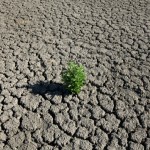As Water Plan Legislation Gets Closer to Reality, Little Opposition Found

Photo by EPA/LARRY W. SMITH /LANDOV
The bottom of the lake after the water has dried up at the Benbrook Lake Dock in Benbrook, Texas, near the peak of the drought in August 2011.
While there are different routes proposed to get there, one goal is clear this legislative session: lawmakers want to do something to address the state’s water woes. Texas faces shrinking water supplies, persistent drought and a growing population. One major initiative that would likely take $2 billion from the state’s Rainy Day Fund to start financing new water projects in the state had a hearing today at the State Senate Natural Resources Committee.
Representatives of farmers, environmentalists and conservative groups all had their say on that proposal, HB 4, by Rep. Allan Ritter, R-Nederland. And for the most part, the plan has widespread support. “I’m getting a little bit worried because the comments by the Texas Farm Bureau sound like the rationale Sierra Club has for supporting this bill,” joked Ken Kramer, Water Resources Chair & Legislative Advisor for the Lone Star Sierra Club, who testified in favor of the bill.
The plan would create a revolving bank, the State Water Implementation Fund of Texas (SWIFT), that would review and approve loans for water projects, things like new reservoirs, brackish desalination and conservation. The loans would be repaid into the bank, which would then use the money for other new projects. 20 percent of the funding would be dedicated to conservation projects, while 10 percent would be directed towards rural areas.
At this point, the only real opposition to the water funding comes from some fiscal conservative groups, who argue that state spending and oversight is largely unnecessary.
Chuck Devore, Vice President of the Texas Public Policy Foundation (TPPF), a free market advocacy group, testified that TPPF has “significant reservations” about using the Rainy Day Fund to start the water bank. “We’d like to point out that spending on infrastructure, including water, is a fairly routine item. As a result we believe it’d be prudent for this money to come out of the spending limit.”
Because of that spending limit, another proposal that emerged late last week would take the spending authority for the water bank and put it in the voters hands, a measure the Texas Public Policy Foundation also opposes.
“We believe this bill does little to address the fundamental reasons why we have a water problem in Texas,” Devore said, pointing the finger instead at the rules and regulations that his group says prevent water from the wet parts of the state from being sent to the dry ones. “If fixed at the state level, this would yield a lot of additional water for Texans.”
In an exchange with State Sen. Robert Deuell (R-Greenville), Devore found himself in a bit of a corner as he tried to explain how the state could address its water crisis without real spending or leadership.
“Do you think increasing acre feet [of water] for Texas is expanding government?” Deuell asked.
It depends on how it’s done, Devore replied.
Deuell then asked if Texas would have enough water 20 years from now.
“Clearly we need more water infrastructure,” again calling for changes to state law to allow more transfers of water instead of funding new projects and conservation.
Deuell wasn’t convinced, asking if new reservoirs were needed as well.
“Yes sir,” Devore replied, but he said the state shouldn’t pay for them, users should.
The questioning went on, with Devore advocating for as small a state role (and funding) as possible.
“The question here today is, should the state put in more money and how should it do it?” Deuell said. He said the debate on how to prioritize, approve and fund water projects reminded him of the saying, “Everybody wants to go to heaven but no one wants to die.” People don’t want to have to pay a lot for water, or have a water pipeline or reservoir on their land, Deuell said, but the history of Texas is one of needing to develop water, with the impact and cost that come along with it. “Other than Caddo lake, there’s really never been a lake in Texas that didn’t take someone’s land, and someone had to pay for it,” he said.
He closed with the thought that what the state does now will have an impact far down the line. “What I hope people say is, ‘I’m glad you did that,'” Deuell said. “Not, ‘Why didn’t you do that?’”
Another bill heard today by the committee’s chairman, SB 4 by State. Sen Troy Fraser, R-Horseshoe Bay, would change the makeup of the state’s Water Development Board, which would have oversight over the water bank and help to prioritize projects. It would reduce the number of members on the board from six to three, but they would become full-time as opposed to their current part-time positions.
Both bills unanimously passed in the committee today 7-0, and now head to Senate floor.



